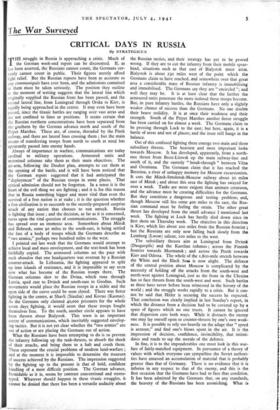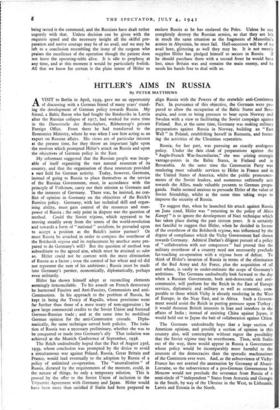The War Surveyed
CRITICAL DAYS IN RUSSIA
By STRATEGICUS
rp HE struggle in Russia is approaching a crisis. Much of 1 the German week-end report can be discounted. If, as has been asserted, the Russians cannot count, the Germans cer- tainly cannot count in public. Their figures merely afford light relief. But the Russian reports have been as accurate as any communiqués have ever been, and the admissions contained in them must be taken seriously. The position they outline at the moment of writing suggests that the lateral line which originally supplied the Russian front has been passed, and the second lateral line, from Leningrad through Orska to Kiev, is rapidly being approached in the centre. It may even have been passed, since the titanic battles are ranging over vast areas and are not confined to lines or positions. It seems certain that the Russian northern concentrations have been separated from the touthem by the German advance north and south of the Pripet Marshes. These are, of course, threaded by the Pinsk railway, and there are lateral lines crossing them ; but the main means of transferring troops from north to south at need has apparently passed into enemy hands.
Always of importance in warfare, communications are today cardinal to military operations. Armoured units and motorised columns take them as their main objectives. The air-arm, following the Douhet plan, attempts to cut them at the opening of the battle, and it will have been noticed that the German report suggested that it had anticipated the " deployment " of the Russian troops in some places. That cynical admission should not be forgotten. In a sense it is the heart of the evil thing we are fighting ; and it is for this reason that in Russia something bigger and more vital than even the survival of a free nation is at stake ; it is the question whether a free civilisation is to succumb to the secretly-prepared surprise attack of any nation that chooses to run amuck. Russia is fighting that issue ; and the decision, as far as it is concerned, turns upon the vital question of communications. The struggle has spread over an immense area. Somewhere about Minsk and Bobrusk, some 90 miles to the south-east, is being settled the fate of a body of troops which the Germans describe as " two armies," perhaps two hundred miles to the west.
I pointed out last week that the Germans would attempt to achieve local and mass envelopment, and the text-book has been faithfully copied. The armoured columns set the pace with such abandon that one headquarters was overrun by a Russian counter-attack. In Lithuania, the fighting appeared to split up into islands of resistance, and it is impossible to say even now what has become of the Russian troops there. The German columns shot to the Dvina, which runs through Latvia, sped east to Dvinsk and south-east to Grodno. Such movements would place the Russian troops in a sickle and the open side of the curve could be soon closed. There was fierce fighting in the centre, at Shavli (Siauliai) and Kovno (Kaunas). As the Germans only claimed 40,000 prisoners for the whole seven days fighting, it would seem that these troops fought themselves free. To the south, another circle appears to have been thrown about Bialystok. This town is an important centre of communications, which inevitably suggested envelop- ing tactics. But it is not yet clear whether the "two armies" are out of action or are placing the Germans out of action.
What the Russians have been attempting to do is to prevent the infantry following up the tank-thrusts, to absorb the shock of their attacks, and bring them to a halt and crush them. These represent the crucial problems of modern land-warfare ; and at the moment it is impossible to determine the measure of success achieved by the Russians. The impression suggested by the fighting up to the present is that of bold, confident handling of a most difficult position. The German advance, formidable as it is, seems by contrast conventional and stereo- typed. Whatever should happen in these titanic struggles, it cannot be denied that there has been a versatile audacity about the Russian tactics, and their strategy has yet to be proved wrong. If they are to cut the infantry from their mobile spear- head, situations such as that east of Bialystok must arise. Bialystok is about 23o miles west of the point which the Germans claim to have reached, and somewhere over that great area a considerable mass of Russian infantry is immobilising and immobilised. The Germans say they are " encircled "; and well they may be. It is at least clear that the farther the armoured units penetrate the more isolated these troops become. But, in pure infantry battles, the Russians have only a slightly weaker chance of success than the Germans. No one doubts their brave stolidity. It is at once their weakness and their strength. South of the Pripet Marshes another fierce struggle has been carried on for almost a week. The Germans claim to be pressing through Luck to the east; but here, again, it is a battle of areas and not of places; and the issue still hangs in the balance.
Out of this confused fighting there emerge two main and three subsidiary thrusts. The heaviest and most important looks towards Moscow. It has developed, apparently, from a north- east thrust from Brest-Litovsk up the main railway-line and south of it, and the easterly " break-through " between Vilna and Oszmiana. The Germans claim that it has reached the Beresina, a river of unhappy memory for Moscow excursionists. It cuts the Minsk-Smolensk-Moscow railway about 5o miles east of Minsk ; and about this area the fighting has swayed for over a week. Tanks are more exigent than animate creatures, and the advance must be creating difficulties for the Germans. But they constitute a dangerous and testing problem; and, though Moscow still lies some 400 miles to the east, the Rus- sian command must be feeling the strain. The other great thrust has developed from the small advance I mentioned last week. The fighting at Luck has hardly died down since its first shots on Thursday week. The objective in this direction is Kiev, which lies about 200 miles from the Russian frontier ; but the Russians are only now falling back slowly from the Lemberg (Lwow) salient, too miles to the west.
The subsidiary thrusts aim at Leningrad from Dvinsk (Daugavpils) and the Karelian isthmus ; across the Finnish frontier towards Murmansk ; and across the Pruth towards Kiev and Odessa. The whole of the t,800-mile stretch between the White and the Black Seas is now alight. The defence of the central position about Moscow is complicated by the necessity of holding off the attacks from the south-west and north-west against Leningrad, just as the front in the Ukraine has to face thrusts from the south-west and west. Such battles as these have never before been witnessed in the history of the world ; and the struggle works rapidly to a crisis. But it can- not be said that. Hitler is securing the success he expected. That conclusion was clearly implied in last Sunday's report, in which the distance from a decision had to be covered up by a spate of figures which no one trusts. It cannot be ignored that dispersion cuts both ways. While it distracts the enemy one may lay oneself open to counter-thrusts by one's own weak- ness. It is possible to rely too heavily on the adage that " speed is armour," and find one's blows spent in the air. It is the impression of decision, confidence, invincibility, that intimi- dates and tends to sap the morale of the defence.
In fine, it is to the imponderables one must look in this war- fare of fairly-matched equipment. In pursuance of a theory of values with which everyone can sympathise the Soviet authori- ties have amassed an accumulation of material that is probably greater than that of Germany. There is no evidence that it is inferior in any respect to that of the enemy, and this is the first occasion that the Germans have had to face that condition. It has been admitted by the Germans that, on any standards, the bravery of the- Russians has been astonishing. What is being tested is the command, and the Russians have dealt rather urgently with that. Unless decision can be given with the requisite speed and the necessary insight all the skilful pre- paration and native courage may be of no avail, and we may be left to a conclusion resembling the irony of the surgeon who praises the excellence of the operation though the patient does not leave the operating-table alive. It is idle to prophesy at any time, and at this moment it would be particularly foolish. All that we know for certain is the plain intent of Hitler to enslave Russia as he has enslaved the Poles. Unless he can completely destroy the Russian armies, so that they are left in much the same situation as the fragments of Mussolini's armies in Abyssinia, he must fail. Half-successes will be of no avail here, glittering as Well they may be. It is not merely supplies Hitler has pledged himself to secure in Russia. If he should purchase them with a second front he would have lost, since Britain was and remains the main enemy, and he needs his hands free to deal with us.































 Previous page
Previous page